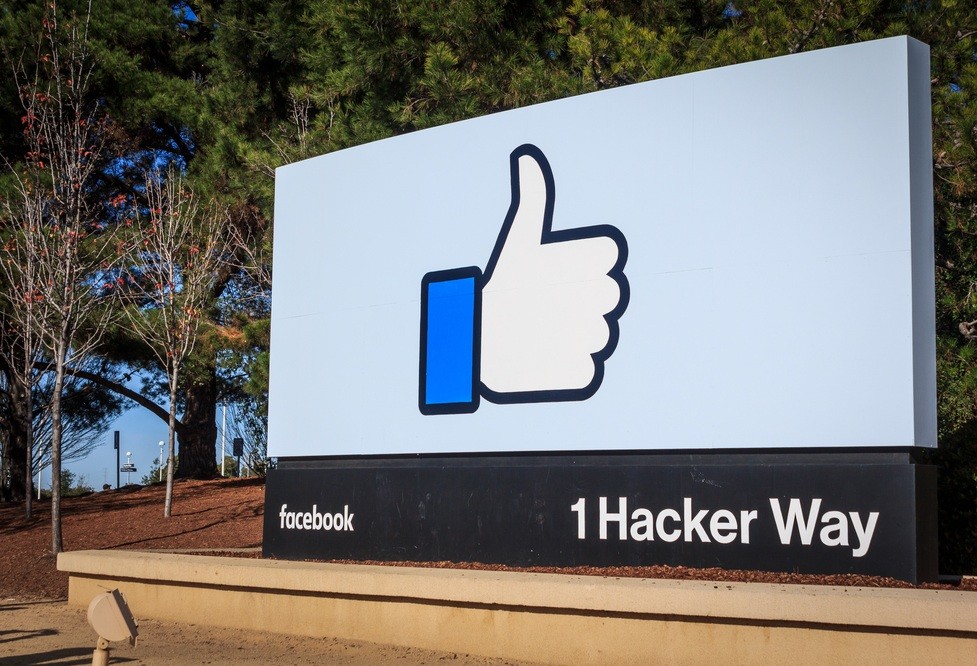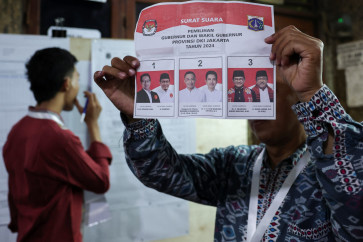Popular Reads
Top Results
Can't find what you're looking for?
View all search resultsPopular Reads
Top Results
Can't find what you're looking for?
View all search resultsMark Zuckerberg: Regret, lack of responsibility
Once again, is Zuckerberg’s apology enough? Is the leaking of data on 50 million social media users a mere ethical problem that can be settled by “sorry”?
Change text size
Gift Premium Articles
to Anyone
F
acebook functions like a family — it knows a lot about you, you’re constantly interacting. Google is more like your neighborhood — it’s there when you need it, but you don’t need it every day.”
Tara Clarke, associate editor at Money Morning was explaining the relationship between new media and its users. Providers of social media services and search engines like Facebook, Google, Yahoo, Instagram and Twitter have always monitored their users.
Through algorithms and improving “cloud” technology these digital giants gather and record users’ identities, habits and behavioral data. They provide digital applications for free, but with these apps they can trace where we are, what vehicles we are using, the restaurants we frequent, items we collect, where we wish to travel, our ailments and so on. They lend us the giant cloud servers for us to use in order for us to save our personal data, but silently they mine this data for their own business interests.
As the world’s most popular social media platform, Facebook was used by 1.9 billion people as of last year according to statista. com. A fantastic figure. Even more so as it means Facebook controls the personal data and behavior of all these people. From the moment users first register on Facebook they submit themselves to the platform. As we update our status and detail our daily activities, upload pictures and comment or like other users’ status, we allow ourselves be recorded and identified by Facebook.
In 2015 the researcher Shoshanna Zuboff introduced the concept of “surveillance capitalism” — capitalism that constantly monitors and spies on internet users to yield maximum data on behavior to support the particular needs of new media companies. Through algorithms and the application of artificial intelligence, social media firms and search engines can process data on users’ behavior to predict patterns of consumption, decision-making and social interactions.
Behavioral data transforms into a “behavioral surplus”, the main instrument of new media business in its monetizing commercial digital activities. Imagine the vast economic potential of predicting consumption patterns and social interactions of internet users around the world. And this behavioral surplus data on a global scale is centralized on a few global corporations such as Google, Facebook and Amazon.
It is in this context that the latest controversy over data leakage of Facebook users takes place. A whistleblower, Christopher Wylie, has revealed that the data of some 50 million Facebookers had been used by a company called Cambridge Analytica (CA) to support the campaign of then candidate Donald Trump in the United States’ presidential election. Initially the users’ data was gathered through the This is your digit a life a pp designed by Cambridge University academic, Aleksandr Kogan.
Through a firm called Global Science Research collaborating with CA, Kogan paid hundreds of thousands of users to conduct personality tests on Facebook. However, the app also “vacuumed” data of the test participants’ acquaintances, yielding tens of millions of data items and personal details. CA processed the data to detect profiles and inclinations of voters in the US presidential election, targeting them for political campaigns.
Facebook boss Mark Zuckerberg has apologized to the American public. However he implicitly stated the fault did not lie with Facebook, but with CA. Facebook was unaware that this was happening. Really? If this is true, the problem is that Facebook does not know precisely how to control its “machine” used to gain enormous profits, while making serious changes to people’s lives. Therefore the problem is equally severe whether Facebook knew about or was totally clueless about the scandal.
Social media users who constantly show off remain unaware of the great potential for manipulation and crime, and criminals are unlikely to be caught because of the complexity of big data and clouds and the inability of law enforcement to reach them.
While the dark side of social media has divided society, international or national legal instruments are insufficient to handle it. This results in avoidance of responsibility by new media firms for their destructive impacts.
Such virtual impunity is reflected in how the state and social media companies and search engines react to the issue of the hacking of internet users’ data. Hacking involving the likes of Edward Snowden and Glenn Greenwald, according to the researcher Vincent Mosco, shows that both authorities (in the US) and companies providing cloud services have focused on handling hacking as a mere criminal violation of privacy.
Yet there are two issues here. First, the inability of companies providing cloud services to protect the data of internet users that they gather and manage. Second, hacking by individuals or groups.
Interestingly it is only the latter activity that is considered criminal — while the second could not occur without the first factor. The companies’ inability to protect internet users’ data should be considered severe malpractice.
Cloud-providing companies gather internet users’ data freely and use it without users’ consent to earn profits. However, when they cannot protect the safety of those users’ data and cause losses to them, these companies do not accept any responsibility. The hacking of the data is considered merely the hacker’s responsibility.
According to Mosco, the hacking of internet users’ data, as experienced by 10 financial institutions in the US in 2014, which jeopardized the data safety of 83 million cloud users, individuals and businesses, shows the severe frailty of the cloud-data system.
Continued hacking attacks remain hidden from the public as the companies providing cloud services (Google, Amazon, Facebook etc.) seek to safeguard their reputation. All attention is focused on the crime of hacking the personal data of internet users, while the main problem lies in the monitoring — the heart of the daily business of such cloud companies and state intelligence bodies.
This practice has brought significant economic and political gains to the companies, without any responsibility for protecting the safety of the data resulting from their surveillance.
Eradicating or reducing such surveillance would reduce the profits of the cloud-providing companies and their clients, and limit governments’ ability to collect data on all their citizens. They will, therefore, do all they can to prevent any efforts to reduce or eliminate such monitoring, even though it would be done for the sake of privacy and the safety of internet users’ personal data.
Once again, is Zuckerberg’s apology enough? Is the leaking of data on 50 million social media users a mere ethical problem that can be settled by “sorry”? Is it a mere technical glitch that can be made good with a promise to fix the data storage of social media users’ data in the future?










